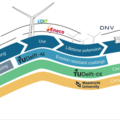Search
D. Convergence Programme WO
About Convergence programme WO Here you can find information about the courses to be passed before you can enter MSc TIL and their schedule.…
2.1 Specialisation TG - Transport Governance
About This specialisation focuses on planning processes. Planning consists of various stages; from global analysis, structured design…
2.4 Specialisation LS - Logistics Systems
About Supply chains may consist of closed (industrial) and/or open transport networks (e.g. road networks, nodes) and require hence an…
2.3 Specialisation TO - Traffic Operations
About This specialisation focuses on the operational management and control of traffic and the technologies and methodologies facilitating…
Project Real Versus Digital awarded

National libraries, such as the KB, National Library of the Netherlands, have been working on digitising their collections for years. Due to…
Kraijenhoff map (1798-1822)

In 1795, the Batavian Republic was proclaimed and a new administrative division evolved (1798). The government needed a map of the entire…
Forms
The forms for the Board of Examiners The forms for the Board of Examiners that are listed on this page can be sent by e-mail to the Board of…
LICHEN-BLADES

While contributing to the growth of renewable energy, wind turbines also contribute to landfill waste and emissions upon decommissioning. It…
B. Cross Domain Graduation Studio - City of the Future
About A cooperation between MSc TIL and the Faculty of Architecture and the Built Environment. In Q1 and Q2 you can choose as an external…
C. Schakelprogramma HBO
About For Dutch students only Hier vind je meer informatie over de vakken die je moet halen en hoe ze geroosterd zijn, om toegelaten te…